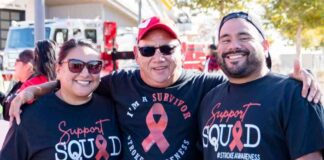Blood banks across the nation are in urgent need of Type O blood donations to combat a severe shortage that is jeopardizing the lives of patients in need of transfusions. The American Red Cross has issued a plea for donors to step up and help replenish dwindling supplies, attributing the shortage to extreme heat and recent natural disasters that have disrupted the regular flow of donations.
In response to the crisis, Vitalant, an Arizona-based nonprofit that operates blood banks nationwide, has highlighted the critical need for Type O blood specifically. This blood type is often referred to as the universal donor because it can be transfused to patients of any blood type in emergency situations when time is of the essence. Without an adequate supply of Type O blood, medical professionals may be forced to turn away patients in urgent need of transfusions, putting lives at risk.
One heartwarming story that illustrates the life-saving impact of blood donations is that of a young girl who survived cancer thanks to her little sister’s lifesaving donation. The sisters were a perfect match, and the donated blood played a crucial role in the older sister’s recovery. This heartwarming tale serves as a reminder of the profound impact that blood donors can have on the lives of others, making it a truly selfless and heroic act.
To address the urgent need for blood donations, Vitalant has organized over 50 blood drives in various parts of Nevada this month. These drives serve as crucial opportunities for individuals to contribute to the replenishment of blood supplies and potentially save lives in the process. For donors like Nina Duren, who has been donating blood regularly for the past 15 years, the act of giving blood is a simple yet powerful way to make a difference in the lives of those in need.
Sheila Macdonell Spiess, a retired trauma nurse with 47 years of experience, emphasizes the perpetual need for blood donations in medical emergencies such as car accidents, stabbings, gunshot wounds, and leukemia cases. The demand for blood is constant and transcends seasonal fluctuations, highlighting the ongoing need for donors to sustain a stable blood supply for patients in critical condition. Spiess’s insights underscore the vital role that blood donors play in supporting emergency healthcare services and saving lives.
As the nation grapples with a significant decrease in blood donations, the focus on Type O blood becomes increasingly crucial due to its universal compatibility for emergency transfusions. The scarcity of Type O blood poses a direct threat to the healthcare system’s ability to respond to medical emergencies effectively, underscoring the urgent need for donors to come forward and contribute to the replenishment of this essential blood type.
Vitalant’s recent report revealed that the supply of Type O blood hit an 18-month low in July, indicating a concerning trend that could impact the organization’s ability to meet the needs of patients in critical condition. Without a constant four-day supply of Type O blood, healthcare providers may struggle to deliver timely transfusions to patients in need, potentially leading to negative outcomes. The organization’s efforts to build up a sustainable blood supply underscore the importance of community support in ensuring the availability of life-saving blood products.
The critical nature of blood donations is further emphasized by the American Red Cross’s disclosure that its entire inventory has decreased by 25%, reflecting a significant shortfall in blood supplies across the board. Dr. Baia Lasky, the organization’s divisional chief medical officer, warns that delays in accessing blood products during emergencies can increase the risk of death by up to 5% per minute, underscoring the urgent need for a robust supply of blood to support medical interventions in critical situations.
In light of the escalating blood shortage crisis, the American Red Cross and Vitalant are striving to mobilize donors and raise awareness about the importance of regular blood donations. The inability to store blood long-term necessitates a consistent influx of donations to sustain adequate blood supplies for medical emergencies. By encouraging individuals to donate blood regularly, these organizations aim to ensure that patients in need receive timely and lifesaving transfusions to support their recovery and well-being.
The ongoing efforts to address the blood shortage crisis highlight the critical role that donors play in supporting healthcare services and saving lives. Whether it’s a trauma victim requiring multiple blood products or a cancer patient in need of transfusions, the availability of blood can make a significant difference in their treatment outcomes. By donating blood, individuals have the power to impact the lives of others in profound ways and contribute to the collective effort of ensuring a robust and sustainable blood supply for emergencies.
Impact of Blood Shortages on Healthcare
The repercussions of blood shortages on healthcare systems are far-reaching and can have serious consequences for patients in need of transfusions. Without an adequate supply of blood products, medical professionals may face challenges in delivering timely interventions to patients experiencing life-threatening conditions. The scarcity of blood can lead to delays in surgeries, treatments, and emergency care, putting patients at risk of complications and adverse outcomes.
In emergency situations such as car accidents, natural disasters, or sudden illness, access to blood transfusions is crucial for stabilizing patients and supporting their recovery. The availability of blood products can mean the difference between life and death for individuals in critical condition, underscoring the vital role that blood donors play in sustaining healthcare services. By donating blood, individuals can directly contribute to the well-being and survival of patients in need, making a tangible impact on healthcare outcomes.
Importance of Type O Blood Donations
Type O blood donations are particularly valuable in emergency situations where immediate transfusions are necessary to save lives. As the universal donor blood type, Type O can be transfused to patients of any blood type without the need for compatibility testing, making it a critical resource for healthcare providers in urgent cases. The versatility of Type O blood allows medical professionals to respond swiftly to emergencies and deliver lifesaving transfusions to patients without delay.
Given the high demand for Type O blood in emergency healthcare settings, donors with this blood type play a crucial role in supporting the healthcare system’s ability to respond effectively to critical situations. By donating Type O blood, individuals can provide a lifeline to patients in need of urgent transfusions, offering hope and healing in times of crisis. The consistent availability of Type O blood is essential for ensuring that healthcare providers can deliver timely and effective treatments to patients facing life-threatening conditions.
Community Response to Blood Shortages
In response to the urgent need for blood donations, communities across the nation are rallying together to support blood banks and healthcare organizations in replenishing blood supplies. Local blood drives, awareness campaigns, and outreach efforts are mobilizing individuals to donate blood and raise awareness about the critical need for blood products. By engaging with the community and encouraging participation in blood donation initiatives, organizations like the American Red Cross and Vitalant are fostering a culture of solidarity and support for patients in need.
The community response to blood shortages underscores the collective effort required to address healthcare challenges and ensure the availability of essential resources for medical emergencies. Through collaborative initiatives and community engagement, individuals can make a meaningful impact on healthcare outcomes and contribute to the well-being of their neighbors and fellow citizens. By coming together to donate blood and support healthcare services, communities can strengthen their resilience and capacity to respond effectively to emergencies.
In conclusion, the urgent need for Type O blood donations highlights the critical role that donors play in sustaining blood supplies and supporting healthcare services in times of crisis. By donating blood, individuals can make a tangible difference in the lives of patients in need and contribute to the collective effort of ensuring a robust and sustainable blood supply for emergencies. As communities unite to address the blood shortage crisis, the power of collective action and community support shines through, underscoring the resilience and compassion of individuals who come together to save lives.

















